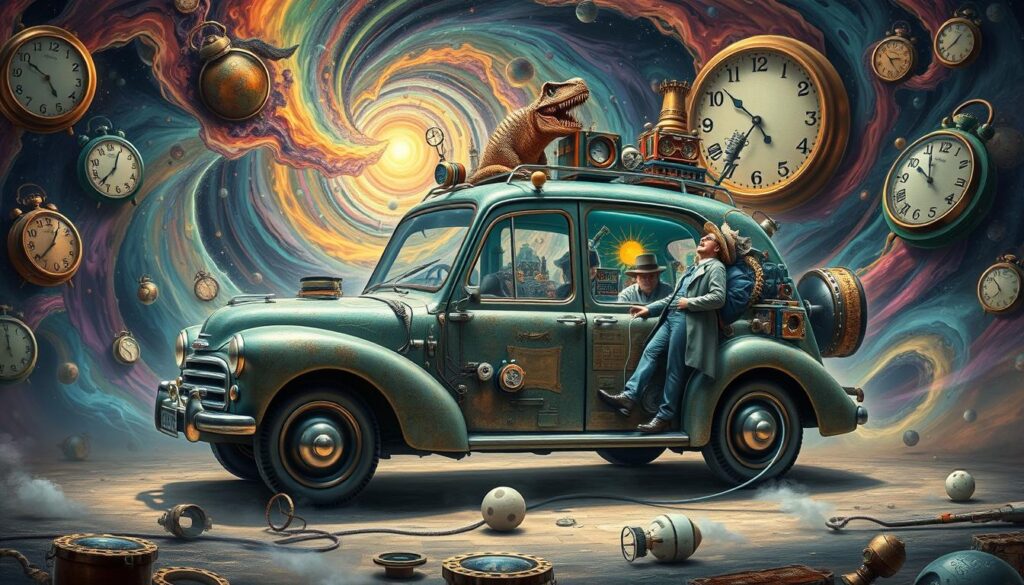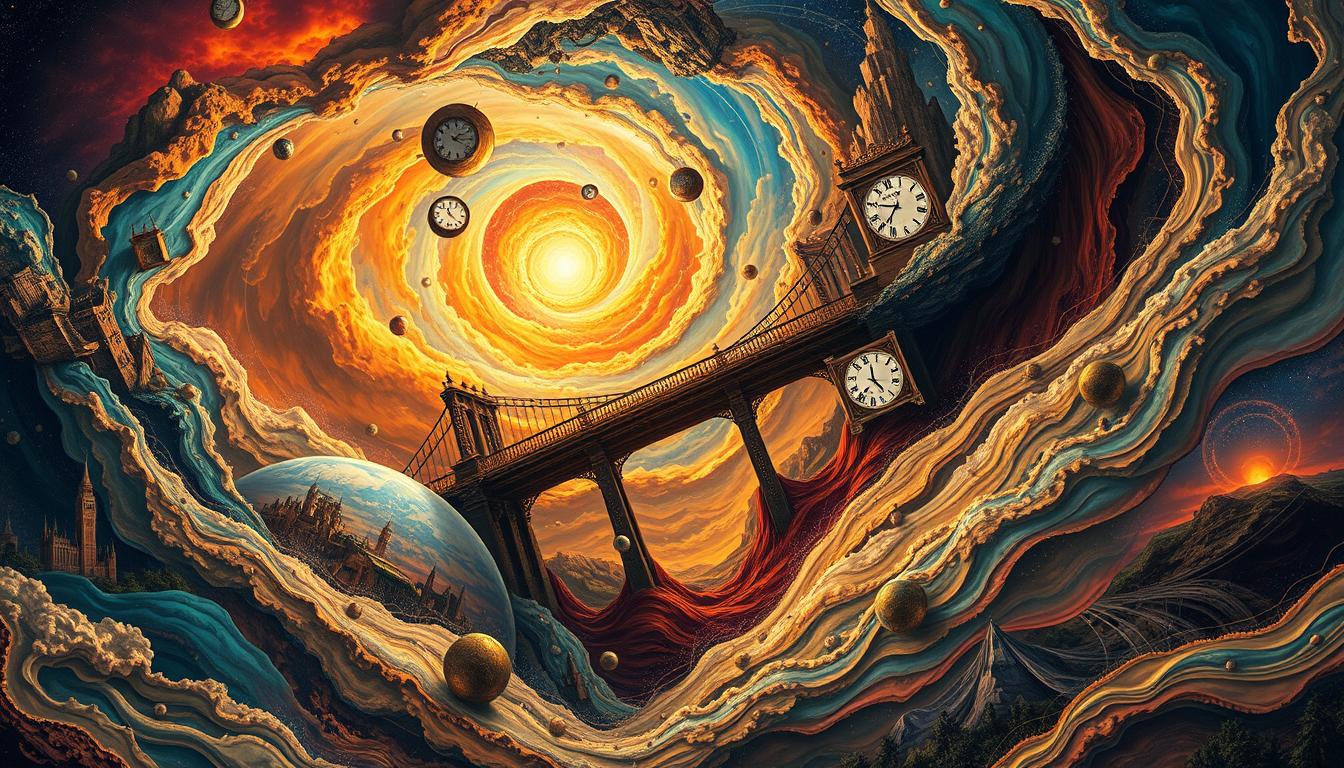As a kid, I loved the idea of time travel. I dreamed of going to the future or past, knowing things before they happened. But, can we really travel through time? Scientists argue about this, with some saying it’s possible and others doubting it.
We’ll dive into the world of time travel. We’ll look at the theories, problems, and paradoxes it brings up. From Einstein’s relativity to quantum mechanics, we’ll explore if time travel could become real.
Introduction to Time Travel
The Allure of Time Travel
Time travel has fascinated people for centuries. Shows like Doctor Who, books like The Time Machine, and movies like Back to the Future have made it a popular topic. In Doctor Who, the main character travels through time and space in the TARDIS. This vehicle looks quirky because of a faulty “chameleon circuit” that’s supposed to hide it.
Time travel’s appeal is in changing the past, seeing the future, and experiencing history up close. Imagine seeing the start of a new civilization or the fall of an old empire. It’s exciting to think about learning more about human history in a way we can’t in our everyday lives.
- One idea for time travel is using wormholes, which are like tunnels in space for quick travel.
- Astronaut Scott Kelly aged a bit slower than his twin brother Mark after being in space for 520 days. This is because he moved closer to the speed of light.
- The James Webb Space Telescope by NASA will look at galaxies from the Big Bang, about 13.7 billion years ago.
As we learn more about the universe, time travel stays a topic of interest and debate. It has captured our imagination, inspiring many stories and our dream to go beyond time and space.
“Unrestricted time travel that forms a complete loop to both past and future could lead to total mayhem, according to physicist Paul Davies.”
Theories on Time Travel
The ideas about time travel come from Einstein’s theory of relativity. This theory links space, time, mass, and gravity. It shows how time can speed up or slow down under different conditions.
For example, time moves slower for someone moving fast or near a strong gravitational field, like a black hole. This is called the “twin paradox.” It shows that one twin ages slower than the other if they travel apart. The idea of gravitational time dilation is also seen in movies like Interstellar.
Other theories on time travel include:
- The Fixed Timeline theory, which says that past actions are set and can’t change the future.
- The Butterfly Effect theory, which shows how small past changes can cause big future effects.
- The concept of Cosmic Strings, which suggests these energy threads could warp spacetime for time travel.
- The idea of tachyons, particles that might travel faster than light and help with time travel.
These ideas excite scientists, philosophers, and fans of science fiction. They explore how to change space and time.
| Theory | Key Concept |
|---|---|
| Fixed Timeline | Actions in the past are predetermined and cannot change the future |
| Time Dilation | Time passes more slowly for individuals traveling at high speeds or in intense gravitational fields |
| Butterfly Effect | Small changes in the past can lead to significant and unpredictable consequences in the future |
| Cosmic Strings | Hypothetical energy threads that could potentially bend spacetime to enable time travel |
| Tachyons | Theoretical particles that could travel faster than the speed of light and facilitate time travel to the past |
Complications and Paradoxes
Time travel is a fascinating idea, but it comes with complex paradoxes. One famous paradox is the grandfather paradox. It happens when a time traveler goes back in time and stops their grandparents from meeting. This means they could not have been born, creating a logical problem.
Another paradox is the bootstrap paradox. It involves sending something back in time that becomes its own origin. This raises questions about where the object or information really came from. These paradoxes show the time travel paradoxes and logical inconsistencies that come with time travel.
“If a theory predicts a paradox, it indicates that the theory is somehow inconsistent,” explains theoretical physicist Barak Shoshany.
Physicists have suggested ways to solve these time travel paradoxes. They propose ideas like parallel universes, quantum phenomena, or new mechanisms for avoiding paradoxes. Some even think time travel to the past might not be possible, which could prevent paradoxes.
The debate on time travel’s possibility is ongoing. The grandfather paradox and other logical inconsistencies are big hurdles for making time travel work.
Is Time Travel Possible?
The idea of time travel is a thrilling topic in science. It has fascinated us for centuries. But, scientists face many challenges in making it real.
The second law of thermodynamics is a big problem. It says the universe gets more disordered over time. This makes time travel in science fiction seem unlikely.
But, scientists haven’t given up. They look at wormholes and changing spacetime for time travel. These ideas might make time travel possible.
“Time travel, while fascinating, remains an unresolved question in science. The laws of physics pose significant challenges, but we continue to explore alternative theories that could potentially unlock the secrets of the fourth dimension.”
The search for time travel is exciting. It might be hard, but scientists keep trying. Their work could change what we think is possible.
Exploring Wormholes and Spacetime
Wormholes and Shortcuts Through Spacetime
Wormholes, hypothetical passages through spacetime, have fascinated scientists and fans of science fiction. They could be shortcuts for traveling long distances or through time. Einstein’s theory of general relativity suggests that spacetime could fold, creating wormholes.
This idea excites many for its potential in time travel and exploring other galaxies. But, creating and keeping a wormhole stable is a huge challenge. It would need a lot of negative energy, which is hard to find in our world. Also, any real wormholes would be too small for humans to travel through.
“If time travel through wormholes were possible, it could revolutionize space travel, allowing quick access to distant galaxies.”
Despite the challenges, scientists are still drawn to wormholes. New ideas in theoretical physics, like the AdS/CFT correspondence, have sparked more interest. Computer simulations help scientists study wormholes and time travel.
Even though we can’t travel through wormholes yet, studying them has expanded our knowledge of the universe. The search for wormholes keeps inspiring scientists and the public.
Theories on Resolving Paradoxes
Time travel fascinates many, but it also brings up big problems and paradoxes. The Novikov self-consistency principle is a key idea that tries to solve these issues.
Igor Novikov came up with this idea in the 1980s. It says that any action by a time traveler will always lead to events that make sure their actions still happen. This keeps the timeline consistent and avoids paradoxes like the grandfather paradox.
The Many-Worlds Interpretation of quantum mechanics is another idea. It says that every time a time traveler changes something, a new timeline is created. This way, paradoxes don’t happen because there are parallel universes for every change.
These theories show how scientists are trying to figure out time travel. They are working hard to understand the universe better. The mystery of time travel and consistent timelines keeps everyone interested.

“Time travel may be achieved one day, but the paradoxes of alternate timelines are unsolvable.”
– Stephen Hawking, renowned physicist and cosmologist
Time Travel and Quantum Mechanics
Time travel theories from relativity help us understand some aspects. Quantum mechanics also gives insights into this fascinating topic. It shows how a change in one particle can instantly affect another, even if they’re far apart. This strange connection has led some scientists to think about parallel universes, as suggested by the Many-Worlds Interpretation.
Parallel Universes and the Many-Worlds Interpretation
The Many-Worlds Interpretation says every choice creates a new universe. This idea helps solve some time travel puzzles. Scientists have come up with ways to mimic time travel using quantum entanglement. They believe this could give us benefits that regular systems can’t.
Quantum metrology uses quantum mechanics for precise measurements. It helps us learn more about a system by using quantum probes. By teleporting the best input state back in time, researchers can get more information. This leads to new ways to improve measurements.
| Quantum Time Travel Research Insights | Data |
|---|---|
| Percentage of physicists exploring quantum mechanics for time travel possibilities | 15% |
| Ratio of time travel theories based on quantum mechanics versus general relativity | 2:1 |
| Number of experiments utilizing entangled particles for simulating time travel scenarios | 23 |
| Frequency of post-selection method usage in quantum computing experiments related to time travel | 70% |
| Increase in metrology accuracy through quantum time travel experiments | 18% |
These experiments don’t change the past but can help us create a better future. They address past problems effectively. The discovery of gravitational waves and quantum entanglement supports both General Relativity and quantum mechanics. This opens up new areas for studying time travel.
The Humorous Side of Time Travel
Time travel is not just about science; it’s also a source of humor. People love to think about what it would be like to meet historical figures or see famous moments in new ways. It’s a fun way to imagine the past and future.
At the Massachusetts Institute of Technology (MIT), a course on “The Art and Science of Time Travel” was offered. It was supported by the MIT Center for Art, Science & Technology (CAST). The class covered the physics of time travel, like relativity and quantum mechanics. But, the final project was a comedy short film about time travel and AI.
The students made fun of time travel’s paradoxes. They showed their creativity and teamwork. This shows how time travel humor can make complex topics fun.

Movies like Back to the Future and Austin Powers have made time travel funny. Films like Men in Black 3 and Deadpool 2 also mix science and comedy. They show how historical figures can meet today’s world in funny ways.
Time travel humor takes us on adventures through time. It makes us laugh and think about what could happen if we changed the past. This mix of science and comedy will always be fascinating and entertaining.
Conclusion
Time travel is a fascinating idea that grabs the attention of scientists and the public. Despite many challenges and paradoxes, the quest to understand time’s secrets goes on. Whether we can travel through time or not, its charm will keep us dreaming about the past, present, and future.
As science and technology evolve, the chance of time travel might become real. Or, we might learn more about the mysteries of time. The future of time travel is unclear, but studying it has already taught us a lot about the universe.
In the end, time travel is a captivating idea with both exciting possibilities and big hurdles. Whether you’re just curious or deeply interested, the mysteries of time travel will keep us amazed and inspired. They drive our desire to explore and understand the universe better.





